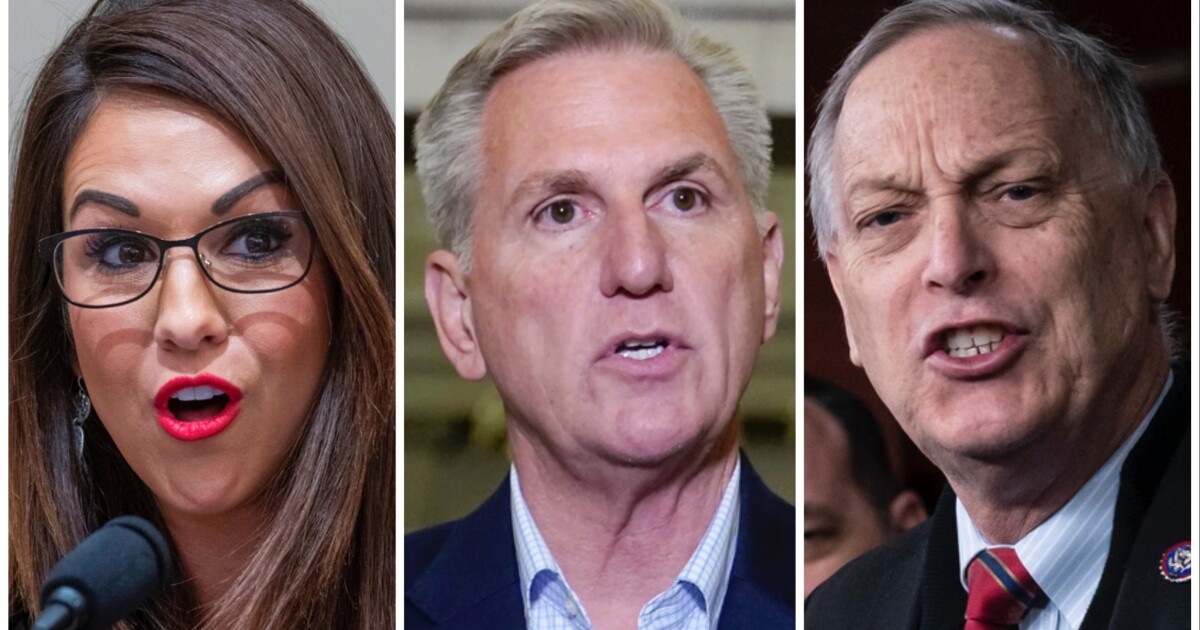

GOP opposition to a bill to lift the debt ceiling has largely, and loudly, come from the expected places: the conservative House Freedom Caucus and those lawmakers aligned with it.
But as Republican members announce how they will vote when the legislation is brought to the floor on Wednesday, Speaker Kevin McCarthy (R-CA) is losing the support of a small but growing number of loyalists. With 24 hours left to whip the bill, his ability to stanch the bleeding will prove critical to its survival.
DEBT LIMIT DEAL: WHERE IT STANDS AND WHAT IS STILL TO COME
The first crop of lawmakers to reject the deal, crafted by McCarthy and President Joe Biden ahead of a June 5 deadline to avoid default, were largely among the 20 Republicans to oppose McCarthy during the speakership election in January. That includes members who refused to back him all the way to the last round, including Reps. Andy Biggs (R-AZ), Lauren Boebert (R-CO), and Bob Good (R-VA).
Their opposition is not unexpected. The deal McCarthy brokered with the White House would only impose modest budget cuts — essentially, a two-year freeze in discretionary spending — while hard-liners wanted steeper budget caps for the next decade.
House GOP leadership called lawmakers back to Washington from a recess on Tuesday to whip votes in person, hoping to limit the “no” votes to the most conservative members of the conference.
But McCarthy has faced some setbacks upon their return as he tries to deliver 150-plus votes for a bill that will attract bipartisan support.
Rep. Nancy Mace (R-SC), a centrist thorn in the speaker’s side who occasionally bucks the party line, announced Tuesday morning she could not support the compromise legislation.
Her decision was followed by some more surprising “no”-vote announcements, including from Reps. Kat Cammack (R-FL) and Wesley Hunt (R-TX), who tend to vote with leadership on most bills.
Cammack, who nominated McCarthy for speaker on the sixth round of voting in January, expressed disappointment that regulatory reforms she had pushed for were excluded from the final compromise, while Hunt wanted add-ons like border security.
McCarthy suffered another blow when Rep. Vern Buchanan (R-FL), a senior Republican on the Ways and Means Committee, came out against the bill. The speaker passed over Buchanan for the top spot on the committee in January, choosing instead to give the gavel to Rep. Jason Smith (R-MO).
The defections come at a precarious time for McCarthy. The Freedom Caucus is doing what it can to whip against the bill; some members have even threatened to hold a “no confidence” vote against him for moving legislation they say falls short of the deal they struck with him in January to secure the speakership.
The bill is expected to receive sizable Democratic support, but if McCarthy can’t get a “majority of the majority” — in other words, half of his conference — to back it, then he is in danger of what Rep. Matt Gaetz (R-FL) called a “black letter violation” of the speaker’s January agreement.
House Minority Leader Hakeem Jeffries (D-NY) added to that pressure on Tuesday, telling reporters that McCarthy must keep his promise to get two-thirds, or roughly 150, of his members on board.
Multiple Republicans speculated that he would be able to do just that, though the speaker himself declined to answer whether it was a benchmark he could meet.
He could be seen whipping votes aggressively on the House floor Tuesday.
McCarthy’s own majority whip, Rep. Tom Emmer (R-MN), told reporters leadership was shooting for 218 — the magic number to pass a bill in the House.
CLICK HERE TO READ MORE FROM THE WASHINGTON EXAMINER
“We’re whipping every day. I’m confident that we’re going to do well,” he said. “We whip for 218. We don’t whip for 150.”
Before the bill can come to the House floor, it must first clear the Rules Committee, where hard-liners had threatened to derail its passage. Rep. Thomas Massie (R-KY), a libertarian aligned with the Freedom Caucus, announced during a markup hearing Tuesday that he would cast the deciding vote in favor of advancing the legislation.





